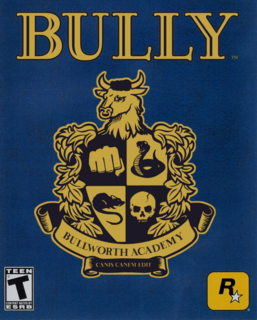Bully offers a classic open-ended gameplay experience in a unique setting and delivers a product that is just plain fun.
Bad: Some BGM and dialogue get stale by the end. Ending feels shallow and tacked on. Little motivation offered to do everything in the game.
Replay value: Moderate
Rockstar Games have taken a package that is quite familiar to many gamers of this generation and bestowed upon it an entirely new context. By doing so, they have accomplished two things: they have neutralized some (though not all) of the controversy surrounding their chosen topic mediums for video games, and somewhat deflated the irony of "gangsta"-esque entertainment being produced for a particular community that is stereotypically non-"gangsta". Placing their protagonist Jimmy Hopkins in a boarding school adds a harmless juvenile touch to the mischief involved, and presents its audience with a setting with which most of them are probably a bit more familiar.
Quite simply, Bully plays very well. Controls are responsive for the most part, adding to the entertainment value of performing required tasks, fighting, and making use of the games several methods of transportation. Some slight flaws exist, such as the clunky skateboard controls. You earn the skateboard early on, which seems like a generous gesture on the game's part, but if you're anything like me, you find that running is a more convenient (though) slower alternative to falling on your face or having your speed reduced to a slow chug every time terrain changes even the slightest bit. Fighting is entertaining, especially when you incorporate shoving, taunting, and bullying "finishers". Your fighting repertoire is rather shallow at first, but the moves you learn throughout the game offer you great variety in the ways you can attack opponents.
The story is well presented. From the very first cutscene, you sympathize with the protagonist Jimmy Hopkins as someone who is certainly capable of earning good marks and being a decent person, but whom circumstances have forced to take mischievous actions time and time again to defend his integrity. The characters with whom Jimmy interacts, though a bit over the top, are frequently so well scripted and voice acted that they become quite believable, and even a little deep, by the story's end. Different people playing the game will probably find themselves gravitating towards different cliques based on their natural inclinations. The game supports this notion by giving Jimmy a huge variety of clothes to wear, effectively allowing you to informally ally yourself with any faction in the story. Although this has little effect on the general progression of the storyline (that would have been an amazing twist if it did), it adds to the feeling of uniqueness in your gameplay experience. You might even find yourself thinking as you stare at your wardrobe options, "Is today a Preppy day, a metalhead day, a nerd day, a greaser day, or a jock day?"
The background music is probably a little different than what would be expected, often times having a synthesized Danny Elfman feel to it (the bike riding BGM is a perfect example). Again, it's a bit unexpected but it works, which is an identical summation for the entirety of Bully's premise and presentation.
The game has minor flaws. The BGM, though unique, is generally unchanging throughout the game and can get a bit tiresome by Chapter 5. Character dialogue during interactions with NPC's out of cutscenes is often shallow and repetitive, a stark contrast to the cutscene dialogue. (It even includes storyline errors, like being attacked for dress code at times when you're not technically a student.) There are a few frustrating gameplay mechanics as well. For example, it's very easy to accidentally run somebody over while on a bike or using some other form of transportation, which quickly turns whatever task you were engaged in into a flee from authority, usually ending with task abandonment or failure. The game also offers little motivation to do all the tasks and collections to earn a 100% completion rating. There are no bonuses for future playthroughs, which really hurts the replay value. Primary motivation for replays will probably be to experience the story once more. The game's worst detraction is in its shallow and tacked-on ending, which almost cheapens the entire storyline progression to near worthlessness.
Despite the game's few setbacks, Bully is still a unique gameplay experience that puts a fresh face on a newly classic formula. It's fun to play and has some truly memorable characters in it. It's quite likely that Bully's uniqueness will help it overcome its moderate replay value and encourage players to periodically return to it every so often following the initial completion.

